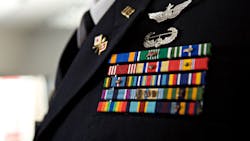Why Military Training Will Benefit the New Trump Administration
With Donald Trump’s presidential inauguration just days away, many Americans worry that the Trump Administration will usher in a police state with so many retired generals holding top positions in the new government. It’s a misperception, however, because there is so much more to serving in the military than shooting guns, leading wars or following orders.
Rather than question how many former military leaders should serve in the Trump Administration, a better topic for discussion would be whether these military appointees have the relevant skills and experience to succeed in their new jobs.
The military is one of the finest leadership training organizations in the world, with training focused on problem solving. Despite the perception that soldiers, sailors, Marines and airmen are blindly required to obey any order given, the reality is that they are trained to disobey any order that is unlawful.
As an institution, the military is also one of America’s great equalizers, a place where people of all races and ethnic backgrounds, rich and poor, receive the same opportunities to advance and succeed. The military was fully integrated long before the rest of America when President Harry S. Truman began the process by issuing Executive Order 9981 in 1948, desegregating the armed forces.
Because we are a country that relies on an all-volunteer force for defense, most citizens lack the first-hand experience or training that members of our armed services receive. Congress certainly lacks the training or discipline: while more than half the members of Congress are millionaires, less than 20% are veterans. Most service members, including officers, earn modest salaries compared to members of Congress.
In many ways, military leaders relate to the U.S. population better than members of Congress. Congress is populated mostly with wealthy lawyers, and as we’ve seen, their leadership has been so lacking in recent years that the public no longer trusts Congress to serve the will of the people or guide America toward success. Polls do show, however, a strong public trust in our military. So, maybe a new, brass-heavy administration isn’t such a bad thing.
Our founding fathers framed the U.S. Constitution to ensure the military would be under civilian control. According to Stanford historian David Kennedy, “disaffected veterans brought Mussolini and Hitler to power, born and bred in the soil of increasing misunderstanding between civil and military sectors. It is a venerable American tradition that the citizens not only staff the military but they control it.” I don’t believe the appointment of retired military personnel changes this.
As someone who has served in the armed forces and worked with many veterans, I can attest to the positive attributes that those with military service can bring to any administration. Many top-flight companies go out of their way to recruit men and women with military experience because they:
- Know how to get things done, exhibiting a “can do” attitude and relentless passion to exceed goals.
- Never quit.
- Believe in responsibility, honor, discipline, humility and a promise to never leave anyone behind.
- Maintain consistent and transparent leadership with a higher standard than those they are leading.
- Strive to do the right thing.
- Are loyal to their country.
Trump’s choice for Secretary of Defense, retired Gen. James Mattis, and his selection for Homeland Security Secretary, retired Gen. John F. Kelly, are excellent picks. Gens. Mattis and Kelly have been de facto ambassadors, often meeting with heads of state of foreign countries that fell within their areas of responsibility. They are both outstanding leaders who I expect will be highly successful in their new roles.
It remains to be seen how Trump’s other military appointees like former Navy officer and chief strategist Stephen K. Bannon will perform, but from my perspective the benefits of military experience outweigh the negatives. Those with military experience understand how to turn strategy into action, how to learn from experience, how to get things done, and they understand the toll a war takes on society, much more than others - all skills and perspectives that can help the new government make wise decisions that benefit the American people.
Ritch K. Eich, author and former hospital executive, is a Captain, U.S. Naval Reserve (ret), who was lauded in the Congressional Record by U.S. Senators Dan Coats and Richard Lugar for his civilian and military career contributions. Eich is a California-based management consultant and his three published books are: Real Leaders Don’t Boss; Leadership Requires Extra Innings; and Truth, Trust + Tenacity: How Ordinary People Become Extraordinary Leaders. The proceeds of his books are being donated to charities.
